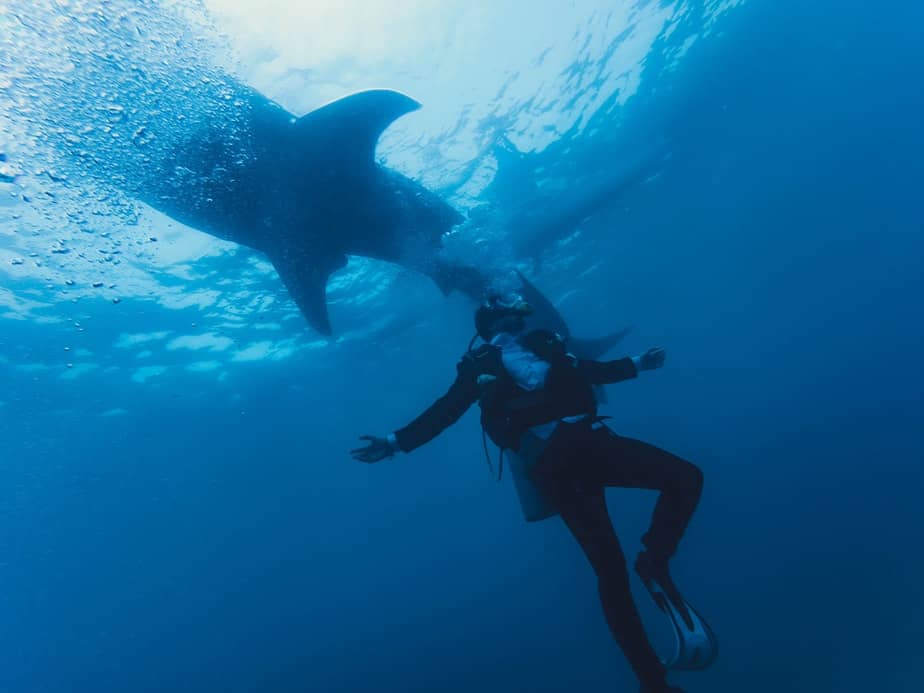When you think about all of the terrifying things about the ocean, are sharks the first thing that come to mind? What about the very real and more likely danger of experiencing rough weather, equipment malfunction, decompression sickness or drowning?
In comparison, sharks are not much of a threat. Chances are, you won’t even see one on most dives. Yet, the fear of sharks is still very real because of sensationalized headlines and movies about shark attacks. Many people are shocked to learn that a fatal shark attack is so unlikely to happen, that you have a higher chance of getting into a fatal accident on your way to the dive site. In fact, most of the time, sharks are wary of humans and keep their distance.
Why do sharks not attack scuba divers? We’ll see that sharks might be curious about humans, or perhaps shy or even scared of us. Very rarely are sharks hostile towards divers. Mostly, we are an anomaly to a shark. Our “skin” is unlike anything they’ve seen, our regulators release bubbles loudly, we are often in groups, we don’t smell like anything they’ve smelled, and so on. If they ever attack, it is often because they were provoked.
In this article, we’ll go over the reasons why sharks generally don’t attack scuba divers. Sharks are such a low risk to us that many thrill-seeking divers actively seek them out to dive with them. We’ll also cover how you can safely dive with sharks and look at the real facts regarding how dangerous sharks are to scuba divers.
Are sharks scared of scuba divers?

Sharks are one of the most deadly creatures in the ocean. They have powerful jaws with rows of razor sharp teeth that can tear through flesh and bone effortlessly.
In terms of hierarchy, they are almost at the top of the food chain, just below orcas (killer whales).
To suggest that sharks are scared or wary of us gives the impression that sharks consider us a threat. Do sharks really perceive humans as a creature on the level of the killer whale?
We have to remember that many animals cannot think in the same capacity as humans. Instead, they rely on their senses and instinct. They may appear inquisitive around humans because we are so unlike the other marine life they typically encounter, so either they stay away, or a brave shark might approach to better assess what we are.
Once they have considered the situation (and really, they aren’t thinking the same way humans do), they will display more sensible reactions – either fear or aggression.
Keep in mind that sharks are near the top of the food chain; they have few natural predators except orcas and larger sharks. What reason do they have to be wary of us? We’ll discuss how they perceive humans in the next section.
With that said, like most wild animals, sharks are incredibly cautious. There are no hospitals out in the wild; an injury could lead to their eventual demise. So despite their apex status, sharks are incredibly cautious and will go hunt prey they are familiar with if they can’t figure us out. A group of divers might even appear to be a larger animal to them, which deters them from approaching.
Depending on the environment, how many divers are with you, and what equipment you are using, sharks appear to leave most scuba divers alone.
We have to consider how a shark’s senses can be confused by this strange creature known as scuba divers that might cause them to avoid humans and their activities as much as possible.
What senses do a shark have?
Sharks have incredibly sharp senses that they can use to locate prey over a mile away. Here are all of the senses they rely on to do this incredible feat.
- Hearing. Sharks are known to detect low-frequency pulsating sounds, similar to those made by a group of spawning fish or injured prey, from over 1 mile away.
- Vibration sensors. At a distance of 100 m (330 ft), a shark’s lateral line system kicks in. A row of fluid-filled sensory canals on both sides of its body can detect movement and pressure changes, almost like they can feel something in the water despite being so far away.
- Smell. We know that sharks love the smell of blood. They can smell the equivalent of a few drops of blood as far as a third of a mile away. Thankfully, they aren’t particularly interested in human blood.
- Electrical sensors. One of a shark’s most extraordinary sensory systems is its ability to detect electricity. Sharks can literally detect muscular activities in its prey, even if they are hiding under the sand.
- Sight. Those cold dead eyes a shark has can spot movements up to 25 m (82 ft) away, assuming clear water conditions. They can even see in dim light. However, as you can probably tell, compared to what a shark can smell or feel with their vibration sensors and electrical sensors, sight is not particularly important to a shark. That’s why some sharks have parasites in their eyes, rendering them completely blind, yet they can hunt just fine.
How do sharks perceive scuba divers?
With all of their incredible sensory capabilities, how do sharks perceive divers? We can better understand why sharks might be scared of us when the sensory feedback we give them is totally unlike anything they’ve ever encountered.
First, as we mentioned, if a shark comes across a group of divers, it doesn’t think, “Jackpot”! It thinks, “that group of divers looks like a giant fish that might injure me. Best stay away”.
Their sensitive hearing will be overloaded with a deluge of information. The loud noise the bubbles make whenever a diver exhales, the excited shouts of the divers when they see a shark, the tank bangers, rattles, and other noises us noisy humans make probably distresses the shark.
It’s also unlikely that us scuba divers smell or look anything like the prey sharks typically hunt.
The shark’s vibration sensors will likely be confused by the collective finning that a group of divers is doing, which can confuse them.
Depending on how much electrical equipment we bring, such as our dive computers, cameras, dive torches, air transmitters, and so on, the constant buzzing, flashing, and magnetic interferences from these devices sends a confusing image to sharks.
All in all, even if a shark is not scared of scuba divers, it will certainly be confused. Again, creatures in the wild are typically cautious, so if they don’t understand us, they’ll leave us alone.
It is not a good idea to try and provoke a shark. At the end of the day, if an animal feels threatened, their fear or confusion will turn to anger, and they’ll retaliate.
Are sharks naturally curious creatures?
Just like how each person has a different personality, so too does each shark have a different personality. Some are more fearful and shy, so they’ll keep their distance. Others are more bold or naturally curious, so they’ll approach.
As a reminder, a shark’s behavior can differ depending on location and how many divers are around you. For instance, a scuba diver close to the reef (shallow waters) is unlikely to receive any attention compared to a solo diver out in the open water.
Once a shark has taken an interest in you, it doesn’t mean it’s hostile. They’ll approach you very carefully. Remember that it perceives you as something large, loud, and unknown. You could be the biggest threat in the world for all a shark knows. So they’ll approach slowly to avoid injury.
The sharks that appear to be the most curious tend to be Oceanic Whitetips and Bull Sharks. They may have gotten used to human activities in the area and therefore are less fearful of us.
Activities like fishing, spearfishing, or fish feeding can cause sharks to become extremely excited. Remember that they can smell a drop of blood from a third of a mile away, and they particularly love fish blood. In this case, they aren’t coming for you; they’re coming because of the fish that you hunted.
One of the rules for guests of the ocean, and life in general, is not to feed wild animals. If enough divers feed sharks, it encourages sharks to approach humans because they associate us with food.
Where shark feeding is common, instead of being deterred by the presence of humans and all of the weird sensations we give them, sharks will instead happily approach divers because we are their benevolent providers of food.
What is the typical encounter with a shark like?
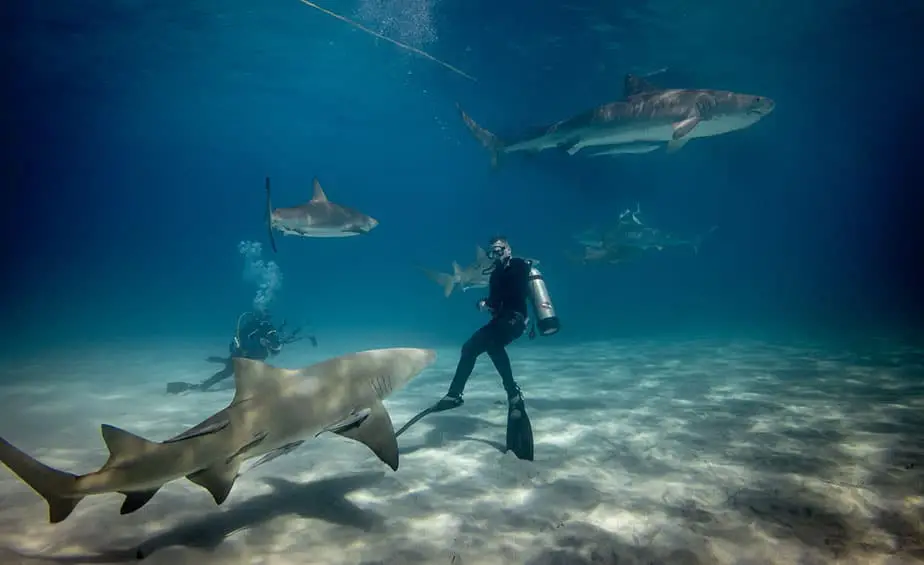
Depending on your perspective, seeing a shark up-close is either a happy memory to be treasured forever, or a terrifying experience you never want to repeat again. Some people are adrenaline junkies who love to flirt with danger, and that’s why shark diving is a thing.
When a shark approaches you, it might raise your pulse, but typically it is enjoyable and perhaps even desirable. It will be yet another interesting story you get to tell at family reunions. Most of the time, a shark is approaching because it’s assessing an unknown creature.
If you notice a shark circling you, it doesn’t necessarily mean you’ll be its next meal. Most likely, it’s using its lateral line system to figure you out. Generally, a shark will circle once or twice and then leave unless you do something to attract or provoke the shark.
Again, sharks that have been conditioned to receive food from humans will be much bolder and will practically demand food from you.
Since sharks don’t have hands (their fins don’t count), they might resort to using their mouth as a final test to see if something tastes interesting.
There have been stories from divers that have had their SMB or their fins nibbled on a bit by a curious shark, especially in areas where the sharks are conditioned to be around humans.
How often are sharks aggressive towards scuba divers?
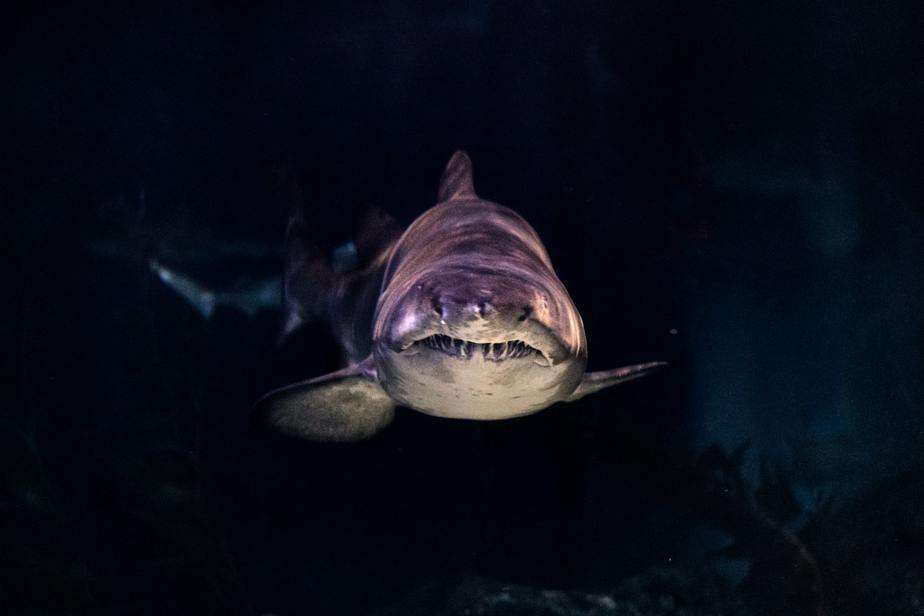
When might a shark exhibit aggressive behavior? What does that even mean?
If you notice a shark circling you, pay attention to its other behaviors. If you notice its pectoral fins are pointing down stiffly, and it is swimming more erratically or frantically than normal, it can mean that it’s agitated by your presence.
At this point, you need to quickly analyze your own behavior. Were you doing something to provoke it, such as making unusually loud noises or hunting fish in its presence? It’s hard to say exactly what the shark is thinking, but try to keep your distance and stay calm. If you were to make sudden, erratic moves, then it can agitate the shark even further.
Typically, perceived aggression from sharks is almost always the shark acting defensively. If it feels it’s being harassed or provoked, it will attack you in self defense.
If a shark is starved for food and desperate, it may, in extremely rare cases, attempt to eat a scuba diver. Statistically, the chances for this to happen is 1 in 3,748,067. On the other hand, the chances of drowning is 1 in 1,134. Which do you think is the bigger threat here?
Some other signs of aggression from sharks is lifting its nose, contorting its body to an “S” shape, approaching uncomfortably close, and repeatedly bumping against the diver.
Sharks do the majority of their feed at dusk and down, so if you’re worried about being the victim of a shark attack, try to avoid diving during that time.
Are sharks scared of the regulator’s bubbles?
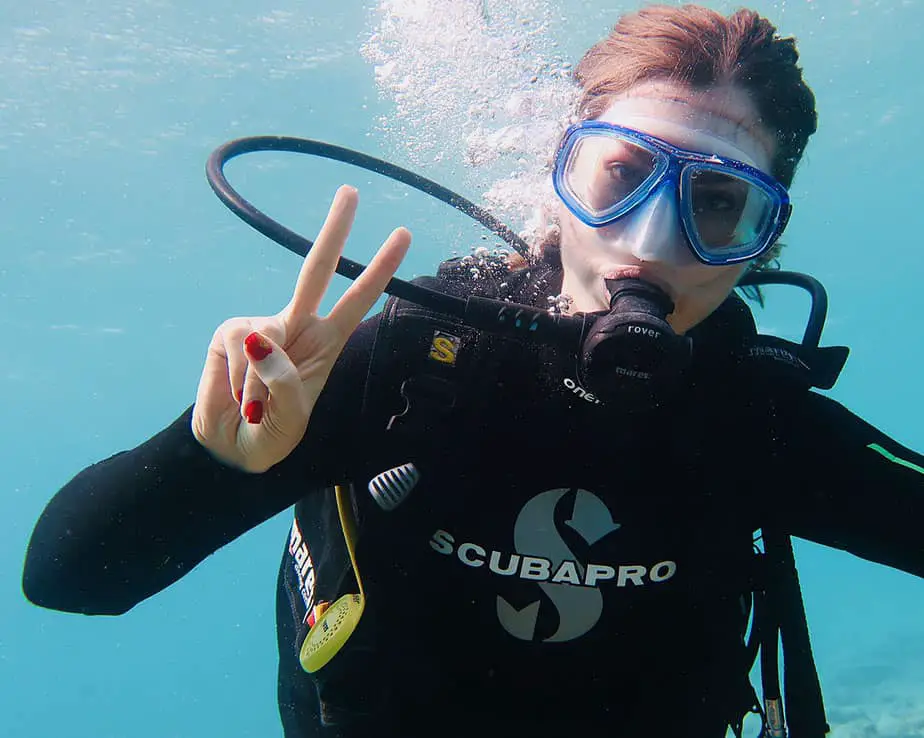
Scared is perhaps too strong of a word, but sharks may find it alarming or off-putting to experience the noise and movement created by the bubbles. The other fish in the ocean don’t do that, so they are uncertain of what that means.
If you find a shark getting uncomfortably close, it’s sometimes recommended that you make even more bubbles or noise to startle the shark. The sudden increase in bubbles may cause the shark to think it’s in danger and it will likely flee.
With that said, this tactic may or may not work depending on how acclimated the sharks are to humans. As we mentioned, feeding sharks causes them to learn behaviors that are detrimental to further human encounters. These sharks are emboldened and not afraid of the bubbles anymore; in fact, to them it may be a sign that a human is coming to feed them.
What to do if a shark approaches you
First, let’s understand its behavior so you can see how the solutions provided can help you against a shark.
Sharks seem to have an unnaturally accurate ability to detect fear, much like dogs. They love to approach a diver that seems to be scared, especially if the diver is separated from the group. They won’t attack right away (if at all), but there are some signals to look out for.
The shark will size you up by swimming in a circle around you. At some point, it will swim directly toward you only to divert at a certain point. It will swim in a circle around you again, only this time, the circle is a bit tighter. Again, it will approach you, diverting away closer and closer to you.
Each repeat of this cycle is the shark testing you to see what you will do. If you remain passive, it gets emboldened each time. At some point, it will actually bump into you. It might even take a little nibble, just to see if it likes what it tasted. Most of the time, it concludes that you are not on its menu and swims away. In extremely rare instances, it may attack.
If you want the shark to stop sizing you up, you have to break the cycle yourself. If the shark gets as close as 2 m away from you, it’s time to take action. Here’s how:
- No matter what, do not panic and try to swim away. It’s not like you can outswim a shark anyways. Also, this erratic, jerky behavior is reminiscent of the movement an injured animal makes, and that excites the shark.
- Stay close to your group. A group of divers will look intimidating to a shark, and they’ll keep their distance. If you’re alone, follow the tips below.
- Make a lot of noise and bubbles to startle the shark. If it comes in for another drive-by, yell at the shark or blow bubbles. This alone will likely cause the shark to change its mind about you and flee.
- Go to the seabed if possible. Sharks like to attack their prey from beneath or behind them. Staying low means it cuts off one possible point of attack. Maintaining eye contact with the shark means you never expose a weak spot.
- Hit them right on the nose. As we mentioned, some sharks might not be scared by bubbles at all, and are simply too comfortable around humans. We normally don’t recommend touching marine life, but at this point you don’t have many options left. So give the shark a good smack on the nose. This is akin to hitting a man in the nuts. Shark noses have millions of nerve endings, so even a tap on the nose can scare them away.
How much of a threat are sharks to scuba divers?
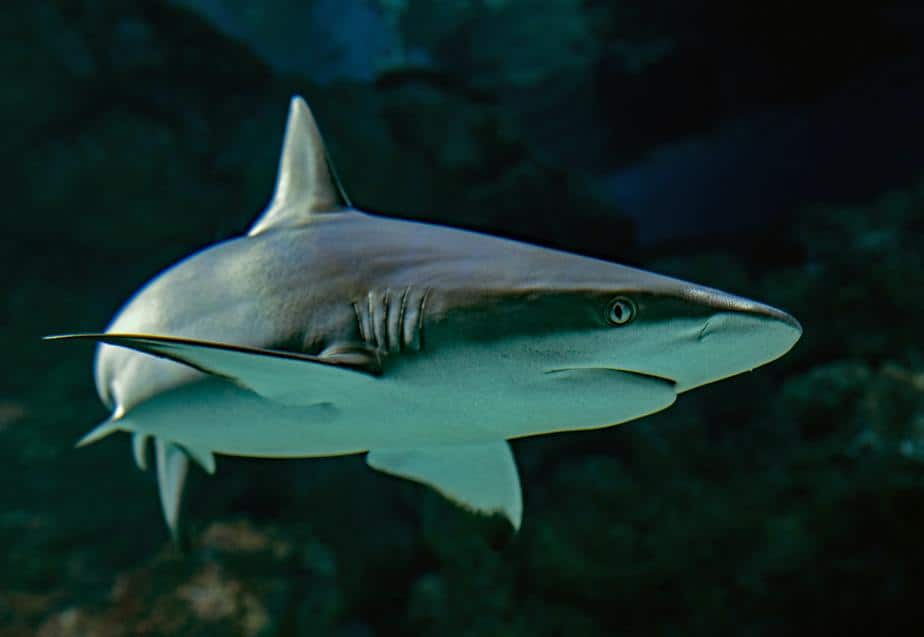
We gave a statistic earlier – the risk of falling victim to a shark attack is 1 in 3,748,067. That means that every year, millions of scuba divers head out into the water – and some even deliberately seek out sharks to swim with – with no incidents.
You have a much higher chance of drowning or succumbing to decompression sickness, so that should be your main area of concern.
All of this is to say, sharks are not a threat to scuba divers, assuming you are not actively trying to provoke it or acclimating it to human behavior.
Remember that everything about humans is unlike what they have encountered before. All of a shark’s senses will be confused by our loud bubbles, use of electronic devices, yelling, banging of tanks, occasional vertical swimming, our shape, and so on. We are in no way an attractive food source to sharks.
Out of the roughly 500 species of shark in the world, all of them have more to fear from humans than we fear them. At the end of the day, humans are the true apex predators of the entire animal kingdom.
Due to overfishing, we have reduced shark populations by over 70%. Over 100 million sharks are killed by us every year – whether that’s from fishing or from pollution. That’s a mind-boggling 11,000 sharks killed every hour. A considerable number of shark species are on the verge of extinction.
Thankfully, scuba diving tourism is one incentive that can help preserve sharks around the world. As many thrill-seeking tourists travel the world to enjoy shark encounters, the tourism industry saw a golden opportunity to make money while preserving the sharks.
Parting words
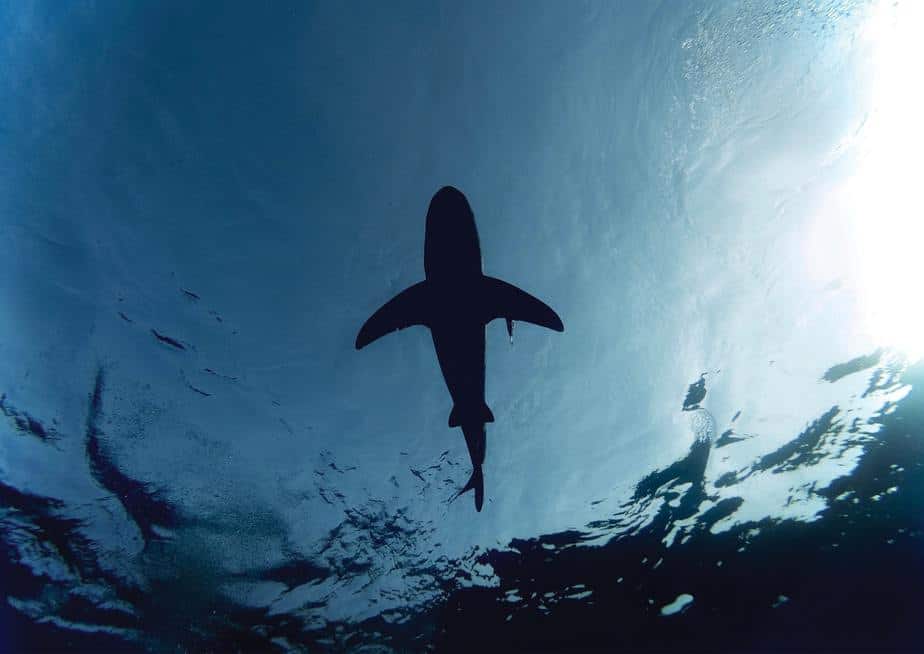
Statistically and anecdotally, sharks generally don’t attack scuba divers. They have good reason not to. We’re weird, we’re potentially dangerous, we probably don’t taste good. Shark encounters are not something to be feared.
Scuba divers’ opinions on sharks are heavily split. Some say that shark encounters are some of the most magical experiences that a scuba diver will experience underwater. Others say that they are some of the most terrifying, traumatizing events they have ever been in.
Can we blame divers for thinking this? The popularity of Jaws and all of the sensational headlines portraying sharks as insatiable devourers of anything that moves have gotten many divers on edge before even encountering a shark. Also, it’s generally a bad idea to get close to a wild animal in the first place – whether you’re on land or underwater.
However, the leading theory is (and the statistics seem to back this up) that sharks are wary of us, perhaps even scared of us, and the end result is sharks overwhelmingly do not attack divers.
Thus, if you ever encounter a shark while diving, instead of reacting fearfully (which would only worsen the situation), try to be brave and realize that the shark is probably more scared of you than the other way around.
Sharks encounters can be awe-inspiring if you keep your wits about you. Just follow sensible practices (don’t touch, feed, or provoke them) and you can leave with an amazing story to tell your friends.

